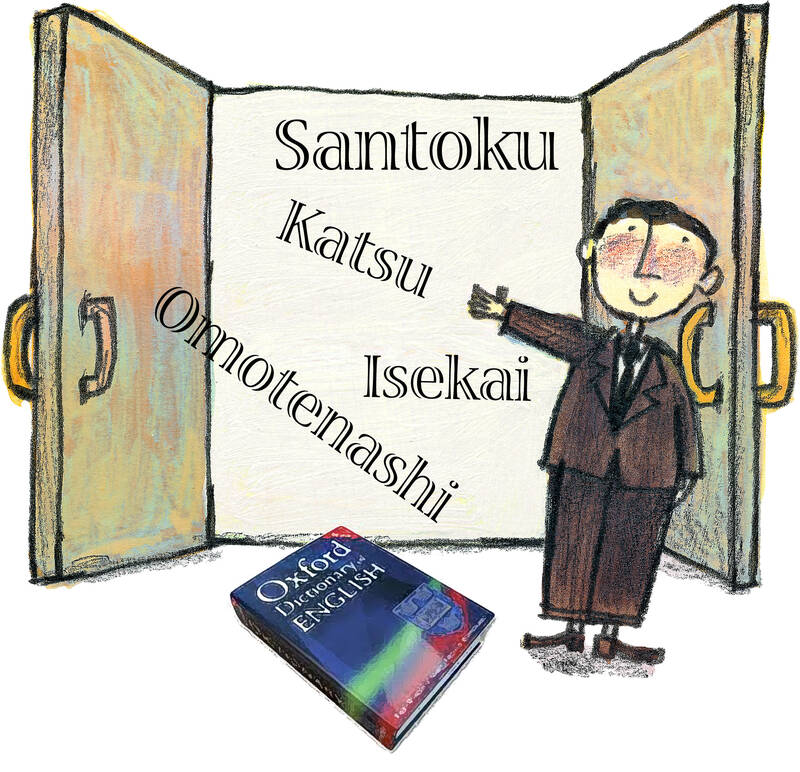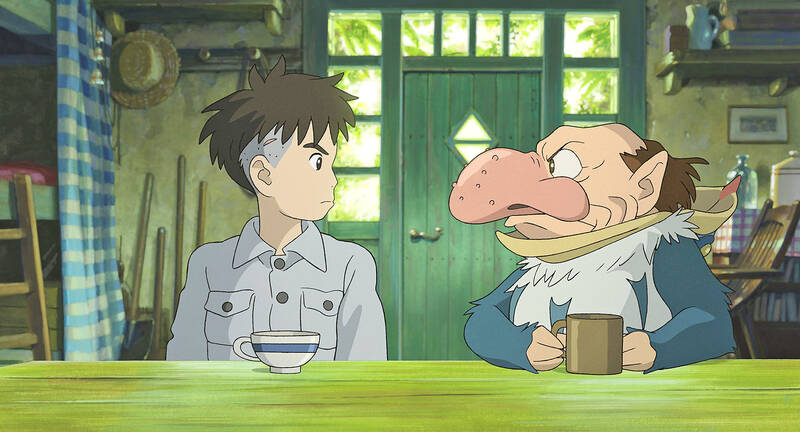Katsu, donburi and onigiri are among 23 Japanese words added to the Oxford English Dictionary (OED) in its latest update.
More than half of the borrowed words relate to food or cooking. Santoku, a knife with a short, flat blade that curves down at the tip, and okonomiyaki, a type of savory pancake, were both added. Okonomiyaki is derived from okonomi, meaning “what you like,” combined with yaki, meaning “to fry, to sear.”
Katsu — a piece of meat, seafood or vegetable, coated with flour, egg and panko breadcrumbs, deep-fried, and cut into strips — is considered a boomerang word, a case of reborrowing: katsu is the shortened form of katsuretsu, which is a borrowing into Japanese of the English word “cutlet.”

GRAPHIC: TT
Donburi, a Japanese dish consisting of rice topped with other ingredients, is also used to describe the bowl in which this dish is served. The culinary use is likely related to the Japanese adverb donburi, meaning “with a splash,” which “could be an allusion to the sound of ingredients being dropped into a bowl,” said Danica Salazar, executive editor of OED’s World Englishes.
Omotenashi, which describes good hospitality, characterized by “thoughtfulness, close attention to detail and the anticipation of a guest’s needs” was also added to the dictionary.
CREATIVE LANGUAGE

Photo: AP
A number of terms related to art also feature in the update. “For centuries, artists from around the world have taken inspiration from Japanese art, and this can be seen in the number of words belonging to the domain of arts and crafts that English has borrowed from Japanese,” said Salazar.
Kintsugi, the Japanese art of repairing broken pottery by joining pieces back together and filling cracks with lacquer dusted with powdered gold, silver or platinum, highlighting the flaws in the mended object, was added. “The word subsequently developed an additional sense indicating an aesthetic or worldview characterized by embracing imperfection and treating healing as an essential part of human experience,” said Salazar.
Isekai, a Japanese genre of fantasy fiction involving a character being transported to or reincarnated in a different, strange, or unfamiliar world, also made the OED. A recent example of the genre is Hayao Miyazaki’s Studio Ghibli film The Boy and the Heron, in which 12-year-old Mahito discovers an abandoned tower, a gateway to a fantastical world.
OED editors worked with researchers from the Tokyo University of Foreign Studies on the new batch of Japanese words. Non-Japanese words added in this quarter’s update include Bible-bashing, ultra-processed and bibliophilia.

Jacques Poissant’s suffering stopped the day he asked his daughter if it would be “cowardly to ask to be helped to die.” The retired Canadian insurance adviser was 93, and “was wasting away” after a long battle with prostate cancer. “He no longer had any zest for life,” Josee Poissant said. Last year her mother made the same choice at 96 when she realized she would not be getting out of hospital. She died surrounded by her children and their partners listening to the music she loved. “She was at peace. She sang until she went to sleep.” Josee Poissant remembers it as a beautiful

March 2 to March 8 Gunfire rang out along the shore of the frontline island of Lieyu (烈嶼) on a foggy afternoon on March 7, 1987. By the time it was over, about 20 unarmed Vietnamese refugees — men, women, elderly and children — were dead. They were hastily buried, followed by decades of silence. Months later, opposition politicians and journalists tried to uncover what had happened, but conflicting accounts only deepened the confusion. One version suggested that government troops had mistakenly killed their own operatives attempting to return home from Vietnam. The military maintained that the

Before the last section of the round-the-island railway was electrified, one old blue train still chugged back and forth between Pingtung County’s Fangliao (枋寮) and Taitung (台東) stations once a day. It was so slow, was so hot (it had no air conditioning) and covered such a short distance, that the low fare still failed to attract many riders. This relic of the past was finally retired when the South Link Line was fully electrified on Dec. 23, 2020. A wave of nostalgia surrounded the termination of the Ordinary Train service, as these train carriages had been in use for decades

Lori Sepich smoked for years and sometimes skipped taking her blood pressure medicine. But she never thought she’d have a heart attack. The possibility “just wasn’t registering with me,” said the 64-year-old from Memphis, Tennessee, who suffered two of them 13 years apart. She’s far from alone. More than 60 million women in the US live with cardiovascular disease, which includes heart disease as well as stroke, heart failure and atrial fibrillation. And despite the myth that heart attacks mostly strike men, women are vulnerable too. Overall in the US, 1 in 5 women dies of cardiovascular disease each year, 37,000 of them